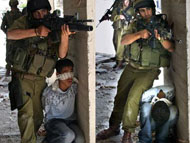| Date posted: October 04, 2010 By Joharah Baker for MIFTAH | |
| The Palestinians are constantly being accused of "playing the victim," an unflattering role by any standards. Many Palestinians would agree that we do not want to be portrayed as the victim so as not to delegitimize our argument or weaken our point. Not that we don't have ample reason to call ourselves victims in the face of Israel's oppressive occupying machine. However, putting yourself in this category necessarily means you are accepting a much weaker starting point than your opponent, a position that begs sympathy rather than rational and valid support. Ironically, Israelis, who themselves often accuse us of this tactic, are even more guilty of it. Actually, their perceived victimization is what they thrive on. What is so baffling is how the same unbecoming tactic works so well for them. Take for example, the recent trial and conviction of two Israeli soldiers accused of using a nine-year old Palestinian boy as a human shield during the 2008-2009 Gaza war. The soldiers had apparently made the boy open bags they believed may contain explosives, something which the boy's family says has traumatized their son ever since. Outside the courtroom, the soldiers' army buddies stood in staunch support of their comrades wearing T-shirts with these words embossed on them: "We are all Goldstone's victims," in reference to the famed Richard Goldstone Report on the Gaza war, which accused Israel of war crimes. Using civilians as human shields – especially children – is one of them. The fact that their army friends forced a young child with no choice but to obey in such a horrible situation was not an issue for them. What they were more concerned with was the perceived injustice they had been done by Goldstone in his report. Israel was, after all, defending itself when it went in and killed nearly 1,500 people in the course of three weeks. Making a small boy open a bag they (and he no doubt) believed was rigged with explosives was surely an act of defense against Hamas' rockets, right? Unfortunately, this is hardly the only "victim" card Israel plays to the world. Everyone understands by now the ultimate victim role played by Israel: that of the Holocaust. It shuts people up, weighs heavily on the consciences of those who still feel pangs of guilt because of it and basically offers Israel a carte blanche for existing both as its own state and as an occupying power. Where else could the Jews have gone after their persecution in WWII? No matter that in granting the victimized Jews a homeland, the world was thus creating a new, fresher victimized nation that had absolutely nothing to do with the Jewish tragedy. Little exploitations – or littler than what Norman Finkelstein calls the "Holocaust Industry" occur all the time. Israelis portray themselves as a democratic and peaceful nation in a sea of Arab hostility. Their security is so extensive because they are under constant threat of terrorist attacks, both inside the country (by the Palestinians) and outside its borders. Israel is victimized by its terrorist neighbors, the Palestinians, by the "looming" threat of Iran and by the threat of anti-Semitism worldwide. All in all, Israelis have covered just about every base possible, even turning the situation around whereby victimizer becomes the victim, much like in the case of the "Goldstone T-shirts." Israel could very well be left to its own devices if it were not for the world – the United States in particular – falling prey to the propaganda time and again, thus casting the Palestinians in an unfavorable light. Israel has consistently insisted that its security comes first, trumping any peace deals or settlement with the Palestinians. This twisted logic has been forced down the world's throat for so long it is no longer even questioned. That has put the Palestinians at a constant disadvantage where they are forced to counter claims that they threaten Israel's "security" while watching how Israel creates oppressive facts on the ground in its name. At the end of the day, this is what we know: Israel continues to occupy the Palestinians and their land, it continues to expand illegal settlements and it continues to maintain the self-granted prerogative to bomb, arrest, kill and harass Palestinians at will. In the meantime, the Palestinians continually find themselves on the defensive, having to counter this lopsided image of Israel as the victims (of Palestinians but also of history) at every turn. Palestinians certainly do not want to be seen only as the victims. At the same time, they also do not want to be forced to defend themselves against Israel's self portrayal as the true victim in this conflict. It is time the smokescreen was lifted. No fair solution can ever be reached if the parties are not on fair ground. All that is required is for the "powers that be" to call a spade a spade. The Palestinians have their problems and they are responsible for fixing them. Israel, however, cannot be allowed to continue milking the whole victim role, especially when it plays the part of the victimizer. Once upon a time, Jews were victimized in the most horrible of ways. But that time has past and we Palestinians should not be made to take the blame. Joharah Baker is a Writer for the Media and Information Department at the Palestinian Initiative for the Promotion of Global Dialogue and Democracy (MIFTAH). She can be contacted at mid@miftah.org. | |


















